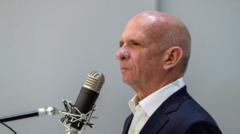Los Alegres del Barranco, a Mexican band, faces visa revocation by the US State Department for projecting the image of drug lord El Mencho during a concert. The backlash stems from their song praising cartel leaders, a controversial element of Mexican cultural music that often intertwines with cartel narratives.
US Revokes Visas for Mexican Band Over Drug Kingpin Tribute

US Revokes Visas for Mexican Band Over Drug Kingpin Tribute
The US State Department has annulled visas for Los Alegres del Barranco after the band glorified notorious cartel leader El Mencho during a concert.
The US State Department has taken action against Los Alegres del Barranco, a Mexican band, by revoking their visas due to allegations that they "glorified a drug kingpin." This decision follows an incident during a concert in Zapopan, Mexico, where the band displayed an image of Nemesio Oseguera Ramos, known as El Mencho, who is the leader of the Jalisco New Generation Cartel (CJNG), a major player in the global drug trade.
Deputy Secretary of State Christopher Landau emphasized the administration’s commitment to scrutinizing the access of foreign individuals to the US, particularly those who promote criminal and terrorist figures. He noted that "the last thing we need is a welcome mat for people who extol criminals and terrorists," reflecting a stringent stance on how immigration policies intersect with cultural expressions that may criminalize or sensationalize such figures.
The controversial display occurred amid a performance where the band sang a song portraying El Mencho as a family man who engages in warfare, alongside a thinly disguised reference to the CJNG. Narcocorridos—songs celebrating drug traffickers—are common in Mexico, where many norteña music bands earn money by creating and performing these tunes at private events often hosted by cartel members.
Los Alegres del Barranco is no stranger to the genre, having previously performed songs paying homage to other notorious drug leaders, including Joaquín "El Chapo" Guzmán. The portrayal of these figures has spurred criticism; for instance, during the band's controversial concert, authorities had recently uncovered a purported training camp linked to the CJNG, raising awareness of the cartel's violent practices.
Mexican officials, including President Claudia Sheinbaum, have condemned the band's actions, stating that such glorification of criminality should not occur. She initiated an investigation into the incident, emphasizing that it is not acceptable behavior.
In a social media response, the lead singer of Los Alegres del Barranco seemed to embrace the attention garnered by the controversy, expressing gratitude for the public's support despite the fallout from their performance. This reflects the complex relationship between music, cultural expression, and the societal impact of drug violence in Mexico.




















